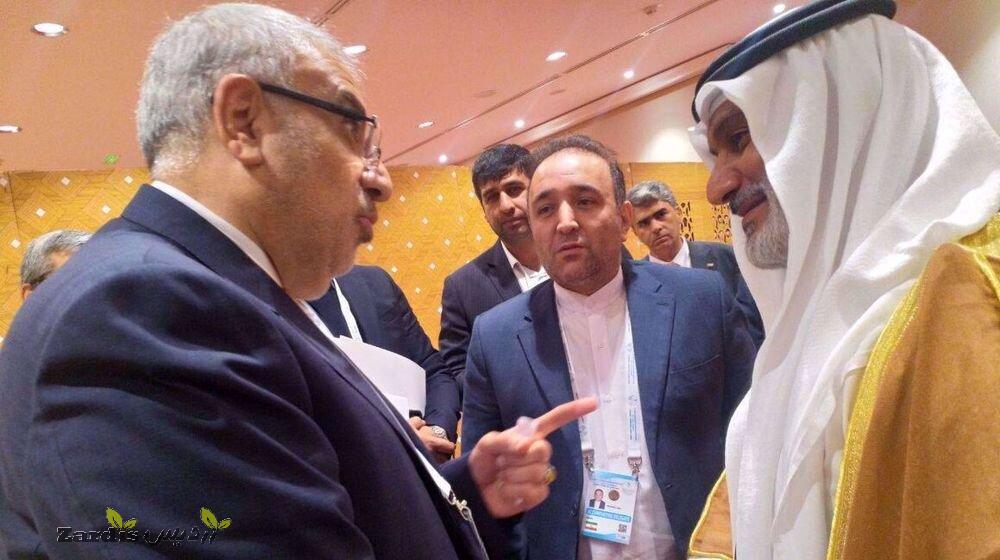Sepahan Oil Company unveiled its latest product entitled “Maglobe” Motor Oil.
Mohammad Hossein Razzaghi Managing Director of Sepahan Oil Company broke the news in a press conference held at the venue of the company on Tuesday and announced that Sepahan Oil Company managed to win approval of German prestigious “Benz” Company producing its world-class product with “Maglobe” brand name.
“Presently, we are in direct talk with three major automakers simultaneously to order to increase approvals for company’s products,” he said, adding that the approval of car manufacturers is that in addition to formulation of product, they also approve production and packaging process.
Also, performance of engine oil must be approved according to the specifications of the engine, he emphasized.
Therefore, “Maglobe” Motor Oil is beyond the global EPI standards and has marked a great achievement in the country’s motor oil industry.
Razzaghi added, “This product is for world-class cars that we used to import, but now our main focus is to help lack of need for import of motor oil for high-model and high-end cars which will also help the country meet its demand in this respect.”
In response to a question about sales of Sepahan Oil Company’s ships, he said, “Out of 8 oil tankers of this company, two were left, which were not cost-effective to maintain due to dilapidation and high age of these ships, and according to international law, these ships could be used only in a specific route moving towards India. Therefore, we decided to sell these ships, the last of which was sold recently.”
Regarding the overdue claims of the company from Ministry of Oil, he said that these claims were initially $102 million, which increased to $110 million according to the documents available at the company.
The case is under investigation, and management team of Sepahan Oil Company did its best to reflect a part of these claims in the financial statements before holding the Annual Ordinary General Assembly meeting, he said, adding, “Given the importance of more thorough investigation, we did not succeed, so that the case is still open and we hope that these claims would be received from the Oil Ministry in the very near future.”
Elsewhere in his remarks, CEO of Sepahan Oil Company put the volume of sales growth of this company at 10%.
He also put the sales growth of the company in the first five months of the current Iranian calendar year (from March 21 to August 21) at 5% and said that this figure is the highest sales growth rate among lubricant production companies.
Presently, the company is facing a problem with provision of feedstock, he said, adding that refineries have shifted to synthetic feed, so they are not able to extract Lube Cut which has created serious problems for the company.
According to Iran Mercantile Exchange Company, the volume of LUBE CUT in Tehran and Isfahan refineries has decreased by 130,000 tons (nearly 30%), which is a significant figure, he added.
Turning to the main reasons behind decrease in feedstock production, CEO of the company said that Isfahan Refinery had three large overhauls which led to a decrease in feed intake, while the company was receiving 30,000 tons of its feed from this refinery. Despite these obstacles created for the company, the management decided to import the feed from Bandar Abbas Oil Refining Company.
Despite the decrease in receiving feedstock, the company managed to witness a jump both in sales and production, Razzaghi underlined.
Stating that any disruption in production activity of the company also will put the market in trouble, he pointed to the feed prices and said, “Presently, feed prices have reached their highest historical figure of 105000 rials but on the other hand, price of base oil has had a fixed and declining trend but according to the arrangements made between exporters, we did not allow the price of Iran’s export oil in the region to decrease.”
He went on to say that the average price of feed has increased from 50 to 60 percent as compared to last year.
Razzaghi expressed hope that Abadan and Tabriz refineries would produce heavy LUBE CUT as shortage of this product would affect the lubrication industry such as transportation.
He put the volume of LUBE CUT required in the country at two million tons annually in a way that five refineries in the country have the capability of producing LUBE CUT.
Sepahan Oil has the ability to receive 15,500 tons of LUBE CUT daily but due to shortage in production of this product, the company currently receives 13,100 tons, he continued.
The company has witnessed a 3.3-fold increase in its sales volume in the first five months of the current year as compared to the same period of last year, he said, adding, “Presently, we have branch offices in 12 provinces of the country and nine other provinces will be added by the yearend (to end March 20, 2022).”
He then pointed to engine oil selling centers as a missing link in the chain and added that shortage of diesel oil is the issue that the company has taken necessary measures in this regard.
With the coordination made in this regard, “We will provide all cargo and passenger terminals, engine oil sales centers, etc. with this product, he emphasized.
In the field of export, the company registered two percent export growth in this period, he said, adding, “If feedstock of the company was provided, we would have more exports, but in any case, it is predicted that the company will export $300 million worth of its products at the current situation and effective steps have been taken in order to enter export currency into the country.”
Razzaghi put the volume of investment needed for implementation of the aforementioned projects at about 6,000 billion tomans.
The CEO of the company also pointed to six projects which are under implementing at the company and added, “Our latest project is the construction of 35,000- ton export terminal tanks which we hope it will be put into operation by February 2022, and accordingly, ships belonging to Sepahan Oil Company will be sent from Bandar Abbas.”
Increasing the production capacity of the company by 100,000 tons is another program which has been put top agenda, he said, adding, “Of course, we also face obstacles to complete the production capacity of 15,500 barrels of feedstock and if this problem is resolved, other 2,000 tons will be added to the productions of company daily.”
In the end, Mohammad Hossein Razzaghi Managing Director of Sepahan Oil Company said: “Planning is underway to export motor oil in bulk form from Chabahar Export Terminal for increasing share of the company at lucrative markets of countries in the region.”
Zardis news | The latest news of Iran and the world
تمامی حقوق مطالب برای "Zardis news"محفوظ است و هرگونه کپی برداری بدون ذکر منبع ممنوع می باشد.
طبق ماده 12 فصل سوم قانون جرائم رایانه ای کپی برداری از قالب و محتوا پیگرد قانونی خواهد داشت.







